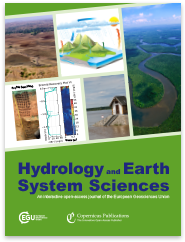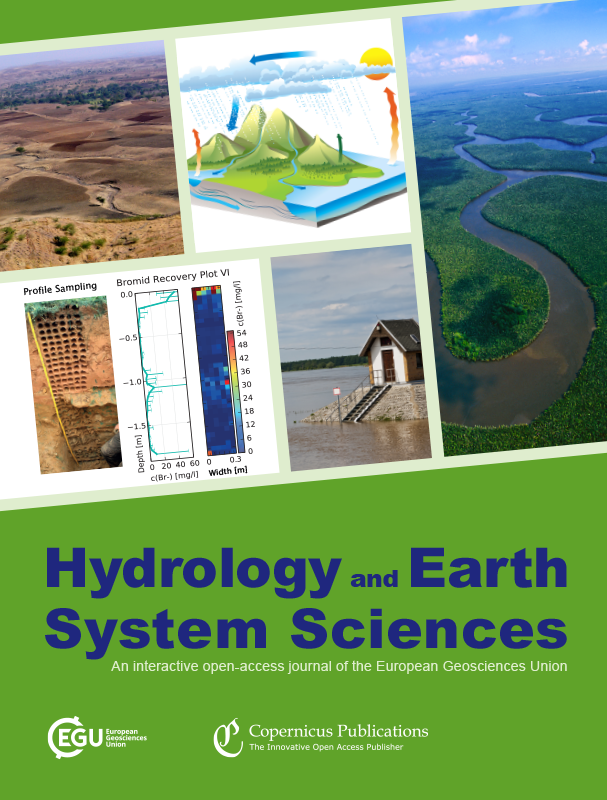Executive editors
: Theresa Blume, Alberto Guadagnini, and Thom Bogaard & Hilary McMillan
eISSN: HESS 1607-7938, HESSD 1812-2116
Hydrology and Earth System Sciences (HESS) is a not-for-profit international two-stage open-access journal for the publication of original research in hydrology. HESS encourages and supports fundamental and applied research that advances the understanding of hydrological systems, their role in providing water for ecosystems and society, and the role of the water cycle in the functioning of the Earth system. A multi-disciplinary approach is encouraged that broadens the hydrological perspective and the advancement of hydrological science through integration with other cognate sciences and cross-fertilization across disciplinary boundaries.
Journal metrics
HESS is indexed in the Web of Science, Scopus, Google Scholar, etc. We refrain from displaying the journal metrics prominently on the landing page since citation metrics used in isolation do not describe importance, impact, or quality of a journal. However, these metrics can be found on the journal metrics page.
News
03 Dec 2025
New MS Word template available for manuscript preparation
The existing MS Word template for authors has been significantly expanded and now includes many important notes on the standard sections that must be included in the manuscript. Please visit the "Submission" page, section "Templates for your manuscript file" and download the new template before writing your next manuscript. 
03 Dec 2025
New MS Word template available for manuscript preparation
The existing MS Word template for authors has been significantly expanded and now includes many important notes on the standard sections that must be included in the manuscript. Please visit the "Submission" page, section "Templates for your manuscript file" and download the new template before writing your next manuscript. 
13 Feb 2026
River intermittency: mapping and upscaling of water occurrence using unmanned aerial vehicle, Random Forest and remote sensing landscape attributes
Nazaré Suziane Soares, Carlos Alexandre Gomes Costa, Till Francke, Christian Mohr, Wolfgang Schwanghart, and Pedro Henrique Augusto Medeiros
Hydrol. Earth Syst. Sci., 30, 849–875, https://doi.org/10.5194/hess-30-849-2026,https://doi.org/10.5194/hess-30-849-2026, 2026
Short summary
13 Feb 2026
Mapping water content dynamics in SAT systems using 3D electrical tomography
Lurdes Martinez-Landa, Jesús Carrera, Juan José Ledo, Perla Piña-Varas, Paola Sepúlveda-Ruiz, Montserrat Folch, and Cristina Valhondo
Hydrol. Earth Syst. Sci., 30, 877–892, https://doi.org/10.5194/hess-30-877-2026,https://doi.org/10.5194/hess-30-877-2026, 2026
Short summary
12 Feb 2026
How well do hydrological models simulate streamflow extremes and drought-to-flood transitions?
Eduardo Muñoz-Castro, Bailey J. Anderson, Paul C. Astagneau, Daniel L. Swain, Pablo A. Mendoza, and Manuela I. Brunner
Hydrol. Earth Syst. Sci., 30, 825–848, https://doi.org/10.5194/hess-30-825-2026,https://doi.org/10.5194/hess-30-825-2026, 2026
Short summary
Highlight articles
22 Jan 2026
High resolution monthly precipitation isotope estimates across Australia from machine learning
Georgina Falster, Gab Abramowitz, Sanaa Hobeichi, Catherine Hughes, Pauline Treble, Nerilie J. Abram, Michael I. Bird, Alexandre Cauquoin, Bronwyn Dixon, Russell Drysdale, Chenhui Jin, Niels Munksgaard, Bernadette Proemse, Jonathan J. Tyler, Martin Werner, and Carol V. Tadros
Hydrol. Earth Syst. Sci., 30, 289–315, https://doi.org/10.5194/hess-30-289-2026,https://doi.org/10.5194/hess-30-289-2026, 2026
Short summary

15 Dec 2025
How do geological map details influence the identification of geology-streamflow relationships in large-sample hydrology studies?
Thiago V. M. do Nascimento, Julia Rudlang, Sebastian Gnann, Jan Seibert, Markus Hrachowitz, and Fabrizio Fenicia
Hydrol. Earth Syst. Sci., 29, 7173–7200, https://doi.org/10.5194/hess-29-7173-2025,https://doi.org/10.5194/hess-29-7173-2025, 2025
Short summary
01 Dec 2025
From RNNs to Transformers: benchmarking deep learning architectures for hydrologic prediction
Jiangtao Liu, Chaopeng Shen, Fearghal O'Donncha, Yalan Song, Wei Zhi, Hylke E. Beck, Tadd Bindas, Nicholas Kraabel, and Kathryn Lawson
Hydrol. Earth Syst. Sci., 29, 6811–6828, https://doi.org/10.5194/hess-29-6811-2025,https://doi.org/10.5194/hess-29-6811-2025, 2025
Short summary
23 Sep 2025
Assessment of source regions of the Zambezi River: implications for regional water security
Mauro Lourenco, Rutledge S. Boyes, Fenton P. D. Cotterill, Tyrel Flügel, Frank C. Nyoni, Goabaone J. Ramatlapeng, and Rainer von Brandis
Hydrol. Earth Syst. Sci., 29, 4557–4583, https://doi.org/10.5194/hess-29-4557-2025,https://doi.org/10.5194/hess-29-4557-2025, 2025
Short summary
More highlight articles  All EGU highlight articles
All EGU highlight articles 
Notice on the current situation in Ukraine
To show our support for Ukraine, all fees for papers from authors (first or corresponding authors) affiliated to Ukrainian institutions are automatically waived, regardless if these papers are co-authored by scientists affiliated to Russian and/or Belarusian institutions. The only exception will be if the corresponding author or first contact (contractual partner of Copernicus) are from a Russian and/or Belarusian institution, in that case the APCs are not waived.
In accordance with current European restrictions, Copernicus Publications does not step into business relations with and issue APC-invoices (articles processing charges) to Russian and Belarusian institutions. The peer-review process and scientific exchange of our journals including preprint posting is not affected. However, these restrictions require that the first contact (contractual partner of Copernicus) has an affiliation and invoice address outside Russia or Belarus.



